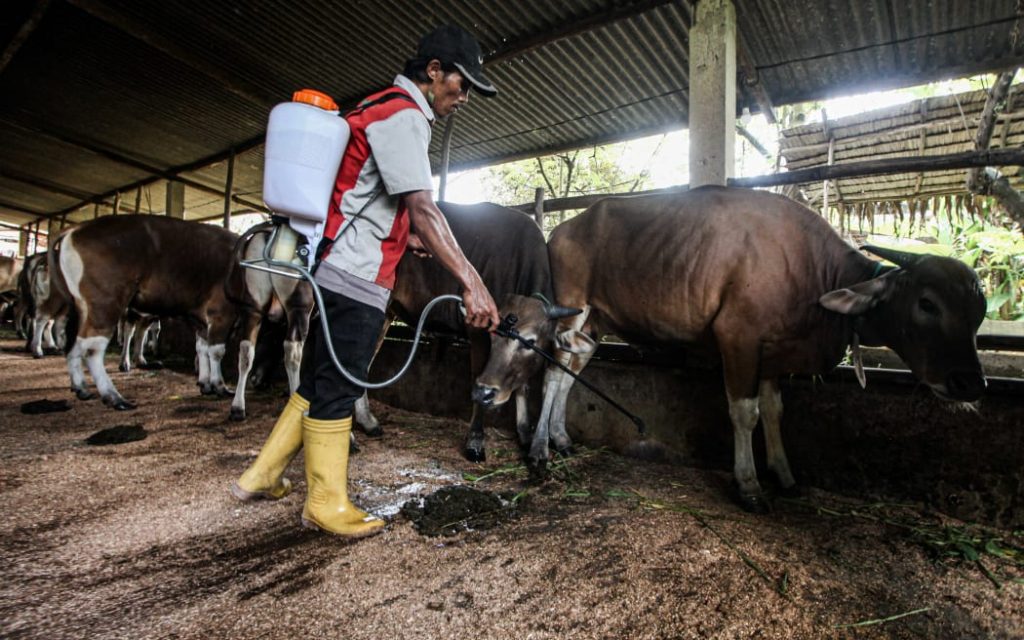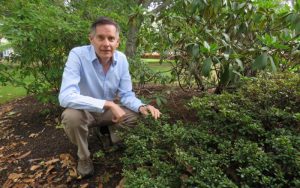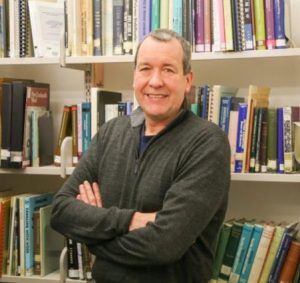It is always a pleasure to learn of the successes of and awards heaped on fellow scientists, some at the start of their careers, others nearing the end.
In recent weeks Massey University has announced two new Emeritus Professors, a title conferred upon retirement by the Honorary Awards Committee in recognition of their service to the university. The title goes to nominees who have been recognised nationally for outstanding work in their disciplines and who have made outstanding contributions to scholarship or the university or both, as well as being held in the respect and esteem of colleagues.

The two new Emeritus Professors are Tony Signal, a leading theoretical physicist in the areas of nuclear and particle physics, and Barry Scott, internationally recognised for his research contributions to the understanding of plant-microbe symbiosis. Barry’s contribution to scholarship includes 17 book chapters and 125 published primary research papers, 30 of them cited 100 or more times.
Barry, who retired from Massey in November 2019, was the subject of a newspaper article in 2014 which said he had tackled some big subjects, from fungus findings to grass growing, mad cow disease to genetic engineering. His work “has underpinned a lot of modern science and aided the advancement of New Zealand’s agriculture sector”.
He was a founding member on the Environmental Risk Management Authority, now called the Environmental Protection Authority, and was at the forefront of many new policies, regulations, protocols and legislation put in place in New Zealand around chemicals, new organisms and genetic engineering.

Then came the news that Riddet Institute scientists from Massey’s Manawatū campus won half of the top prizes in an inaugural International Dairy Federation award. Postdoctoral Fellow Dr Debashree Roy came second equal and Research Officer Dr Nick Smith was third in the IDF Professor Pavel Jelen Early Career Scientist Prize. The prizes will be presented at the IDF World Dairy Summit in India this month.
Debashree’s entry focused on her research into how milk composition and structure impact the release of nutrients at various stages of gastric digestion of different mammalian milks such as cow, goat, and sheep milks. Nick’s entry used a data science and modelling approach to unpick the quantity of food nutrients that come from dairy in our current food system.

In another announcement, Massey graduate Sarah Tallon has won a scholarship enabling her to complete her master’s in Germany. Sarah, who graduated from Massey last year with a Bachelor of Science, was accepted to study her Master’s in Crop Science, specialising in Plant Protection and Plant Nutrition, at Hohenheim University in Stuttgart.
Sarah was the recipient of the 2020 NZIAHS / Massey University Leading Student Award.
At Lincoln University, Amy Well, a Bachelor of Science with Honours student who majored in Environmental Science, has been awarded a Southern Environmental Trust Scholarship, given to students undertaking studies which relate to environmental management and/or planning. She is working on protecting the environment from pollution through a project on the “influence of nitrate concentrations on the reductive dissolution of phosphorus from soils under anaerobic conditions”.
Three Lincoln graduates became regional finalists in the 2022 Young Viticulturist of the Year Competition – Laura Marston (Hawke’s Bay), Katie Cameron (Wairarapa) and Nina Downer (Otago).
PhD student Lucy Hall’s research presentation about how different milking times can improve dairy farm operations scooped the grand prize in Lincoln University’s Three-Minute Thesis competition. James Eggers took out the Master’s prize for his presentation on restoring native birds to agricultural landscapes while enhancing the wellbeing of livestock.
In second place was PhD student Chrystal O’Connor, whose study explores how different plant diets affect the nutritional composition of edible insects, which have the potential to be a sustainable protein source for humans.
Jeremy Kilgour won the newly introduced Honours Dissertation category for his entry on whether variation in leaf-to-blub ratios and the nitrogen content of fodder beet crops affect which is dietary intake in wintering cattle.
My congratulations to all of those named here. And my apologies if you have achieved something or won an award recently but have gone unrecognised in this newsletter. Please contact Bob Edlin to apprise him of accomplishments that have passed our notice.
Foot and mouth disease

Foot and mouth disease, caused by a contagious virus which infects cattle, sheep, goats, pigs, deer and other cloven-hoofed animals, looms large among the many threats to the agricultural and horticultural sectors which NZIAHS members serve. It was described in a recent report from The Detail – quoting Agriculture and Biosecurity Minister Damien O’Connor – as “New Zealand’s doomsday disease”.
Alarm bells rang in this country after Indonesia in May confirmed its first case of foot-and-mouth disease since that nation was declared FMD-free in 1986. Precautions have been tightened because of Indonesia’s proximity to this country and – even closer – to Australia, one of our biggest trading partners.
The presenter of The Detail broadcast talked with Associate Professor Carolyn Gates,Veterinary Epidemiology & Education at Massey University. She explained what FMD is and does; what precautions New Zealand is taking; and what impact the disease might have if it breached our borders.

Dr Axel Heiser, a Principal Scientist at AgResearch, wrote an instructive article on the disease. He described FMD as one of the most devastating diseases affecting the meat and dairy industry globally.
Among his reassuring observations: New Zealand can draw on a body of international research on FMD, as well as significant expertise in livestock infectious disease and crisis management. The recent experience with Mycoplasma bovis, while at a different scale to what FMD may present, also helps in the preparation for any outbreak in New Zealand.
Carolyn Gates and Axel Heiser were among the experts who responded to a Science Media Centre invitation to comment on the disease, the risks of an outbreak here, and what the response would or should be. Comment was provided, too, by Dr Mary van Andel, Chief Veterinary Officer at the Ministry for Primary Industries.
COBRAS

Talking about biosecurity, I welcome the establishment of a new research centre at Lincoln University that aims to solve some of the toughest land-based challenges. The new Centre for One Biosecurity Research, Analysis and Synthesis (COBRAS) will consolidate myriad global efforts to predict and mitigate the impact of invasive weeds, animals and pathogens into a centralised hub at Lincoln University.
The COBRAS multi-disciplinary team comprises researchers from the domains of animal, environmental and plant health, Mātauraka Māori, economics and climate change, and is led by Distinguished Professor Philip Hulme, one of New Zealand’s leading biosecurity scientists.
COBRAS will work closely with relevant Ministries, industry, regional councils and iwi, as well as international partners, such as the Australian Centre of Excellence for Biosecurity Risk Analysis.
Opening the border
In spite of the risk from foot and mouth disease entering the country, I was delighted by the opening of borders that had been closed under policies to deal with Covid-19. Requests for most border exceptions closed at midnight on 31 July, except for some primary sector exceptions which closed on 1 September 2022. Among other benefits, this paves the way for rebuilding the international education sector.
Michael Wood, Minister of Immigration, said that before the pandemic, the international education sector was worth several billion dollars to the country and to education providers. International students used to bring in around $5 billion a year, making it New Zealand’s fourth largest export earner, but that figure dropped significantly in 2021.
Sustainable farming
NZIAHS has often questioned the thrust of the Government’s science spending. But I was cheered to learn that a DairyNZ-led research project helping dairy farmers improve fresh water quality received a $8.98 million boost from the Government.
Massey University is a partner in the project. Its contribution to the research has been under way for two years on Dairy Farm 4.
Over the next seven years the Plantain Potency and Practice programme will focus on proving plantain’s effectiveness at reducing nitrate leaching and nitrous oxide emissions, investigating regional effects, and protecting the supply chain. The programme will use Agricom’s Ecotain environmental plantain because it already has proven effectiveness, but a system for evaluating the environmental benefits of other plantain cultivars will be developed.
Massey University’s involvement will include the continuation of farm trials which are already underway and the expertise of Professor of Pasture Science Peter Kemp, Professor of Dairy Production Systems Danny Donaghy, Associate Professor of Soil Science David Horne, and Research Officer Soledad Navarrete from the School of Agriculture and Environment.
But I am aware that in drawing attention to one project, I am unwittingly ignoring others that deserve my admiration and kudos. Again, if you are working on something we should know about – then please get in touch with our Editor. Bob Edlin (bob.edlin@xtra.co.nz) who will be delighted to hear from you.

View our latest Hot TopicA New Zealand perspective on growing and utilising genetically
modified crops and forages by Dr John Caradus, Grasslanz Technology Ltd, LINK HERE |
NZIAHS Canterbury Forum
“Can New Zealand farmers mitigate climate change?”
Venue: Stewart 1, Stewart Lecture Theatre, Lincoln University, Lincoln
The topic “Can New Zealand farmers mitigate climate change?” has been chosen because the He Waka Eke Noa consultation exercise appears to reveal that New Zealand farmers want to control their own destiny with a farm-based levy option for pricing agricultural GHG emissions and not by a processor-level levy. In this context, what can producers do individually to mitigate their GHG emissions and respond to the climate change challenge?
Speakers: Hon James Shaw, Minister for Climate Change; Dr Rod Carr, Climate Change Commission; Kelly Forster, He Waka Eke Noa; Prof Bronwyn Hayward, Prof Euan Mason and Dr John Reid from the University of Canterbury; Dr Geoff Ross, Lake Hawea Station; Michelle Sands, Horticulture New Zealand; Prof Ken Hughey, Prof Keith Cameron, Prof Hong Di and Hon Prof Keith Woodford from Lincoln University and Chairing the panel at the end of the day, Dr Robyn Dynes from AgResearch.
Registration is $130
We will be again live stream the event – registration to live stream $90
Please register through the website HERE
Professor Julian Heyes
NZIAHS President













